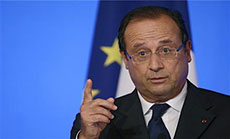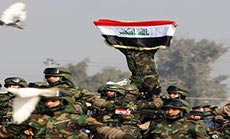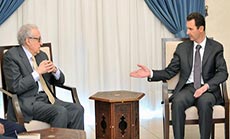“Israel” Concerned of Hizbullah’s Strategy in Next War: Rockets on Tel Aviv, Raids on Galilee

Local Editor
The "Israeli" circles are busy discussing the Third Lebanon's war. Its military is preparing while the dailies reflect the Zionist community's concern with the nightmare of Hizbullah.
Hours after claiming that Hizbullah moved its presence into southern Lebanese villages, "Israeli" Ynet daily chose to shed light on the assumed strategy Hizbullah is to adopt in the next war with "Israel".
 In his second part of analysis, "Israeli" military writer Ron Ben-Yishai stated: "The northern border has been relatively quiet for the past six years, but during this time [Hizbullah secretary General His Eminence Sayyed]Hassan Nasrallah continued to closely monitor the developments in "Israel"."
In his second part of analysis, "Israeli" military writer Ron Ben-Yishai stated: "The northern border has been relatively quiet for the past six years, but during this time [Hizbullah secretary General His Eminence Sayyed]Hassan Nasrallah continued to closely monitor the developments in "Israel"."
Quoting an expert, who has dedicated a large portion of his adult life to studying Hizbullah and its leadership, the writer claimed that "Sayyed Nasrallah learned to read Hebrew so he could understand the "Israeli" political system and the forces that drive "Israeli" society."
In this context, Ben-Yishai viewed that an analysis of Sayyed Nasrallah's recent speeches indicates that he has reached certain conclusions regarding the next conflict with "Israel":
1- A devastating strike on the Tel Aviv metropolitan area or on Tel Aviv itself, or an attack on a key infrastructure facility, will deal a serious blow to public morale in Israel and around the world and grant him the victory photos he craves.
2- The "Israeli" public is more sensitive to deaths among soldiers fighting on the front than it is to civilian casualties. So, from the Resistance Leader's perspective, heavy casualties among the fighting forces will damage "Israel's" internal resilience and undermine the public's support for the war.
This comes as the analyst assumed that Sayyed Nasrallah expects that "Israel" will move five divisions into Lebanon.
3- The ability to intercept and down "Israel" Air Force planes will provide Hizbullah Secretary General with an umbrella that will allow him to maximize the damage to the "Israeli" home front and shore up support from his target audiences. The sinking of an "Israeli" Navy ship will also be considered a great achievement for Hizbullah.
Based on these and other insights, the "Israel" analysis predicts that Sayyed Nasrallah designed the following strategy: At the onset of the next war Hizbullah will fire its heaviest and most accurate missiles and rockets on the Tel Aviv metropolitan area, as well as on infrastructure installations and perhaps on military targets. The rockets will be fired at the fastest pace possible. This opening strike will last a few hours, maybe more, until the Air Force creates room to operate in Lebanon's airspace in a way that will allow it hit every rocket launcher that was detected in advance or during the fighting itself.
It further stated that "in addition to the attack on the Tel Avivian home front and infrastructure, Sayyed Nasrallah plans to cause heavy casualties among "Israeli" soldiers who will enter Lebanon in order to stop the firing of short-range rockets from the southern part of the country. To carry this plan out, his men will use thousands of advanced anti-tank missiles, bombs and mortars that have been deployed in villages. The goal is to kill and injure hundreds of "Israeli" soldiers.
These losses, along with the "Israeli" inability to stop the rocket and missile fire until the latter part of the war, will grant Sayyed Nasrallah an unprecedented moral and physical victory -particularly if Hizbullah will manage to down "Israeli" planes or sink a ship.
According to the daily, there is another aspect to this strategy:
Sayyed Nasrallah plans to order "intervention forces" - Hizbullah's special units - to launch killing raids on "Israeli" communities and seize control of roads located near or along the border with Occupied Palestine. "Hizbullah expects that these raids will cause delays in "Israel's" activity to stop the rocket fire from within Lebanon. Such raids will also hurt morale."
Another possibility is that Hizbullah will launch rockets and missiles toward "Israel" in the event of a massive "Israeli" attack in Lebanese territory.
However, the probability that Hizbullah will get involved in a war with "Israel" over attacks on convoys transporting modern weapons or chemical weapons from Syria to Lebanon is not high. It's response to such attacks will most likely be limited.
In parallel, Ben-Yishai claimed that "Israel" is aware of Sayyed Nasrallah's strategy and is closely following Hizbullah's preparations on a daily basis. "The army is training incessantly to deal with the threat, if and when it is realized. We will have to operate fast and aggressively from the get-go," says a very senior "Israeli" official in the Northern Command. "We have to tell ourselves and to the world, so that no one will be surprised, that Lebanon will spit fire on us from the very beginning and with force that we have not witnessed to this point. We will have to neutralize the attack as quickly as possible with all the means at our disposal."
But within the security establishment, not everything is so clear and organized. There are disagreements between senior "Israeli" officers - mainly from the Air Force - who claim that Hizbullah can be defeated with numerous pinpoint strikes, and those who are convinced that without a ground offensive it will not work. Most of the "Israeli" generals support a ground offensive, despite being aware that it will extend the duration of the fighting and will result in more casualties.
"A ground offensive is necessary for achieving a decisive victory," the daily quoted a so-called security official who deals with the Lebanese threat as saying.
Meanwhile, it tried to assure by the "Israeli" community as saying: "Over the past two years the army has developed systems for gathering intelligence in real time, and today it also has mobile computerized command systems that can be used to send intelligence to the fighting forces regarding the targets they are heading towards."
However, it cautioned that "the problem is that apparently not all field commanders (company, battalion and brigade commanders) have been trained in the use of these revolutionary systems."
"The army should do something about this, and fast," the analyst said as he mentioned additional problems that "Israel" is to face in any confrontation with Hizbullah: Heavy rocket and missile fire will target airports, reserve units' emergency storage facilities, roads that lead to the front and gathering points of reserve soldiers near the border. The Iron Dome missile system cannot provide sufficient protection from Hizbullah's 65,000 rockets and missiles.
"The "Israeli" public must be informed now that the amount of rockets and missiles at Hizbullah's disposal will have devastating effects," a security official said.
Source: Ynet, Edited by moqawama.org
Comments

France’s Hollande in Qatar for Warplane Deal
9 years ago
Iraq Police Dismantles Al-Qaeda Protest Site
10 years ago

